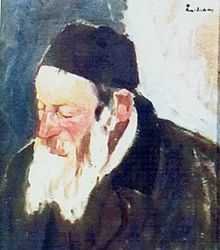- Hakham
-
Hakham (or chakam or ḥaḥam, ḥakam; Hebrew חכם lit. "wise") is a term from Judaism, meaning a wise or skillful man; it often refers to someone who is a great Torah scholar. The word is generally used to designate a cultured and learned person: "He who says a wise thing is called a wise man ["hakham"], even if he be not a Jew" (Meg.16a). Hence in Talmudic-Midrashic literature wise and learned non-Jews are commonly called "hakme ummot ha-'olam" (the wise men of the nations).
Contents
In ancient times
"Hakham" as an official title is found as early as the first Sanhedrin, after the reconstruction of that body, when the Hadrianic religious persecutions had ceased; in addition to the nasi Simon ben Gamaliel, two other scholars stood at the head of the Sanhedrin, namely, R. Nathan as Ab Bet Din, and Meïr as hakham. Another hakham mentioned by name was Simon, the son of Judah ha-Nasi I, who after the death of his father officiated as hakham with his elder brother, the nasi. Just what the functions of the hakham were is not clear. Rapoport's suggestion that he was the arbiter in matters of ritual prohibition and permission is highly improbable. Zecharias Frankel looks upon the hakham as a presiding officer whose duty it was to examine a case in question from all points of view, and, having summed up the results, to present the matter for discussion. It is more probable, however, that the office of hakham was created in order to secure a majority in cases of difference of opinion between the nasi and the ab bet din in the affairs of the Sanhedrin; one of the most eminent scholars was always chosen for the post. A baraita leads to the inference that the hakham was always the director of a school ("bet ha-midrash"), for in addition to the Great Sanhedrin, which later came to take the place of an academy, there were also private academies under the direction of eminent scholars. The origin of the office of hakham is as doubtful as its duration.
Frankel thinks that Joshua ben Hananiah, who lived in the beginning of the second century C.E., was the first hakham, but he does not sufficiently support this assertion. The office seems to have existed in Palestine as long as the academy of the nasi. An amora of the fourth century recounts the following rule of etiquette, still observed in his time: "When the hakham appears in the academy everyone present must rise as soon as he comes within four ells of him, and must remain standing until he has gone four ells beyond". It is hardly possible that the office of hakham existed in Babylonia, where the relation of the resh galuta to the heads of the academy was entirely different from that existing in Palestine between the latter and the nasi. Here "hakham" was merely the term for a Jewish scholar who studied chiefly oral traditions, while the terms "sofer" and "qara" were applied to Bible scholars. In the Seder 'Olam Zutza every resh galuta is accompanied by a hakham, who probably had charge of the religious affairs of the exilarchate; but as this work originated in Palestine, the author probably applied Palestinian conditions to Babylon. The Syrian Aphraates, who had met only Babylonian Jews, mentions a man "who is called the 'hakkima' of the Jews" (Homilies, xxiv), but this too may mean "the wise man" of the Jews.
Among the Sephardim
Among the Sephardim (Spanish-Portuguese Jews) "hakham" is the official title of the local rabbi, but it is not known how old the title is. Shelomo ben Aderet addresses some of his responsa to people with "le-hakham Rabbi . . ." (Responsa, Nos. 79, 395), others again with "la-rab Rabbi . . ." (Nos. 219, 346), but it is possible that "le-hakham" simply means "to the wise." The plural, "hakhamim," is generally used in the Talmud, and also by the Tannaim, to designate the majority of scholars as against a single authority. The Aramean equivalent is "rabbanan."
The surname Hacham represents both Sepharadic and Ashkenazic Jews in its variations: Hacham, Hachamovich, Hachamson.
In Muslim countries
In Muslim countries, a rabbi was often called a hakham because al-Rab in Arabic was one of the names of God and may have caused offense due to misunderstanding. Thus the chief rabbi of the Ottoman Empire was called the Hakham Bashi (Hahambaşı حاخامباشی).
Although the word hakham is derived from the common Semitic root Ḥ-K-M, the second consonant is generally spelled with a ḫāʾ in Arabic and in languages that use Arabic script, to reflect the Hebrew pronunciation: حاخام. The term is cognate to the Arabic words حاكم ḥākim (a ruler or lord) and حكيم ḥakīm (a wise man or physician).
Karaite Judaism
In Karaite Judaism, spiritual leaders are called hakham to distinguish them from their Rabbinic (i.e. non-Karaite) counterparts. Since Karaite theology is based on the use of reason by individuals to determine the applications of the Hebrew Bible's laws for themselves, the role of a hakham is more "advisory" than that of a rabbi in standard Orthodox Judaism.
Further information: Sima Babovich and Abraham FirkovichReferences
This article incorporates text from the 1901–1906 Jewish Encyclopedia article "Ḥakam" by Solomon Schechter and Louis Ginzberg, a publication now in the public domain.
Categories:- Rabbis
- Orthodox rabbinic roles and titles
- Hebrew words and phrases
- Sephardi Jews topics
Wikimedia Foundation. 2010.

